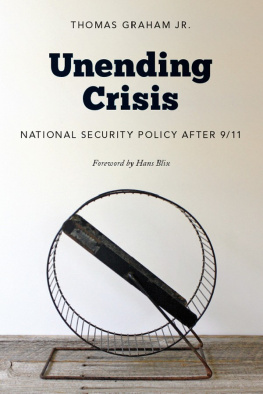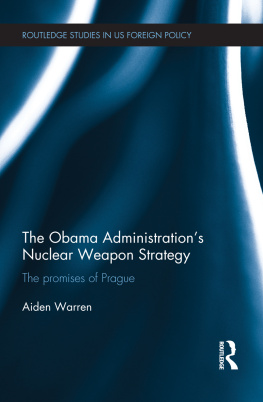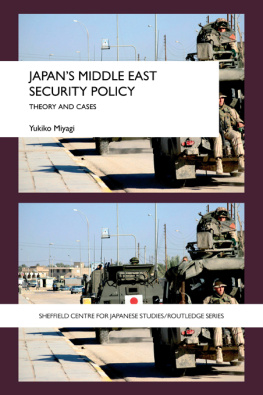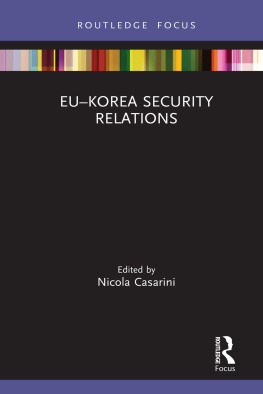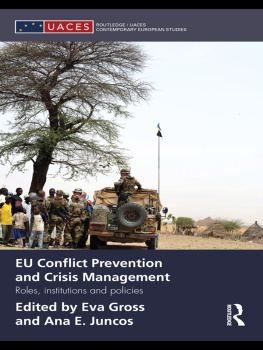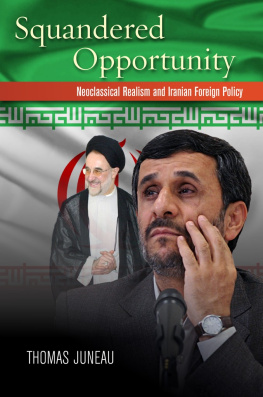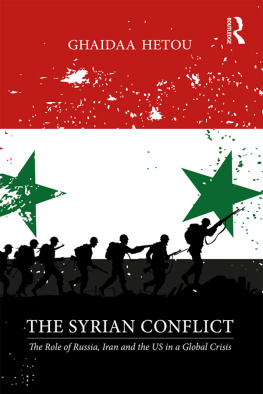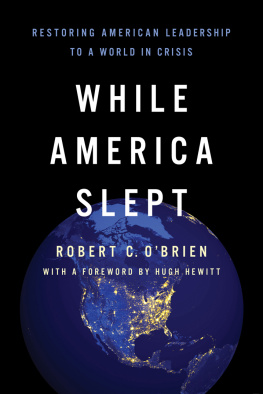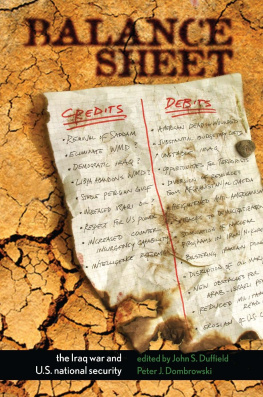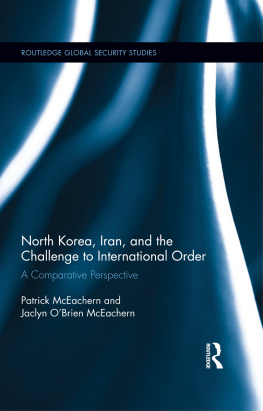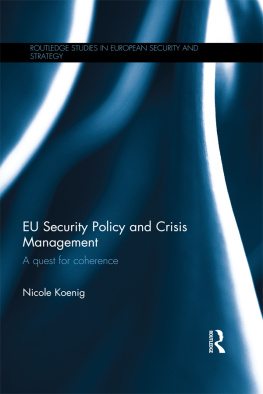2012 by the University of Washington Press
Printed and bound in the United States of America
Design by Thomas Eykemans
Composed in Caslon, display type set in Chunk and Avenir
17 16 15 14 13 12 5 4 3 2 1
All rights reserved. No part of this publication may be reproduced or transmitted in any form or by any means, electronic or mechanical, including photocopy, recording, or any information storage or retrieval system, without permission in writing from the publisher.
INSTITUTE FOR GLOBAL AND REGIONAL SECURITY STUDIES
Jackson School of International Studies
Box 353650, University of Washington
Seattle, WA 981953650, USA
jsis.washington.edu/igrss
UNIVERSITY OF WASHINGTON PRESS
PO Box 50096, Seattle, WA 98145, USA
www.washington.edu/uwpress
LIBRARY OF CONGRESS CATALOGING-IN-PUBLICATION DATA
Graham, Thomas, 1933
Unending crisis : national security policy after 9/11 / Thomas Graham, Jr.
p. cm.
Includes bibliographical references and index.
ISBN 978-0-295-99170-2 (pbk. : alk. paper)
eISBN 978-0-295-80416-3
1. National securityUnited States.
2. United StatesForeign relations19451989.
3. United StatesForeign relations1989I. Title.
UA23.G7747 2012 355.033573dc23 2011041456
The paper used in this publication is acid-free and meets the minimum requirements of American National Standard for Information SciencesPermanence of Paper for Printed Library Materials, ANSI Z39.481984.
Foreword
A BRITISH FOREIGN SECRETARY IS REPORTED TO HAVE DEFINED foreign affairs as one damned thing after another. This timely volume shows that the reality is even worse. Many affairs do not end to be followed by others but simply go on. Some, like Western Sahara, divided Cyprus, Chechnya, and Somalia simmer a bit below the boiling point most of the time. Others, such as North Korea, Iran, Afghanistan, Iraq, Pakistan, and Palestine, which are described in this book, seem to be in unending crisis, putting great power capitals on edge much of the time.
As most of us tend to forget the crises of the past year and concentrate on those that currently preoccupy us, it is of particular value that this book patiently surveys and describes the many twists and turns of each caseover the last decade or two. The historical trail helps us to see where chances for solutions were missed and where counterproductive approaches were taken. In some cases, the overview also gives us ideas as to what factors may be of importance in future efforts to bring an end to the crises, including attention to the perceived security needs and sense of pride of countries like Iran and North Korea.
While the narrative is factual and the book, as the author notes, is directed at policies and not personalities, Thomas Graham leaves you in no doubt that he totally shares the view of President John F. Kennedy that a spread of nuclear weapons would raise terrible threats to the United States and to the world. The Nuclear Non-Proliferation Treaty is, in this view, the most important security-related instrument of our time, and policies and diplomatic moves must be measured against their ability to prevent nuclear proliferation. An old United Nations hand might be forgiven for suggesting that the UN Charter and its rules on the use of armed force are even more basic. Yet all will acknowledge that the agreement in 1995 to extend the Nuclear Non-Proliferation Treaty (NPT) for an unlimited time was a vitally important event in the field of international security.
As one of the key actors in bringing about this success, Thomas Graham is obliged to register that it has been gradually undermined. He directs justified criticism against the George W. Bush administration for macho attitudes that converted chances for solutions into confrontations, in the case of North Korea and Iran, and for launching an unnecessary and disastrous war in Iraq. He also rightly highlights the sad reality that the Western world, led by the United States, missed the opportunity to move with Russia toward a more peaceful and stable world order when the Cold War ended.
Russia's readiness to cooperate and the dissolution of the Warsaw Pact were met not with an effort to create common security but with the expansion of the Western military alliance NATO. The United States, which had become the world's only military superpower, developed the determination to retain overwhelming military superiority. This put a premium on having the freedom to develop armsfor instance, for wars in spacerather than giving up such freedom through arms control agreements. Although the Clinton administration signed the Comprehensive Nuclear-Test-Ban Treaty in 1996, the U.S. Senate rejected the treaty in 1999, preserving the freedom to test these weapons for the United States and others. Later, under the Bush administration, the United States withdrew from the Anti-Ballistic Missile Treaty in order to be free to build a missile shield that could not but impair relations with Russia and China. Demonstrating its total rejection of any international jurisdiction over actions by U.S. military personnel, the administration dissociated the United States from the Statute of the International Criminal Court by taking the unique step of renouncing the signature that had been performed on behalf of the United States by the Clinton administration.
By the time President Barack Obama took office, in 2009, the fruitful dtente that had followed the end of the Cold War nearly twenty years earlier had become a wary peace between the big powers. North Korea had carried out nuclear tests, and Iran seemed to be moving toward a nuclear weapons capability. The United States remained militarily engaged in Iraq and Afghanistan, and there were no hopeful signs in the Israeli-Palestinian conflict. The only silver lining to this picture was a growing understanding that the possession or use of tremendous military force had been of little help in countering proliferation and terrorism but had led to tragic costs in lives and contributed significantly to economic instability.
This developing awareness formed a good political background for the bold campaign that President Obama launched for the revival of international arms control and disarmament. The new policy was greeted with enthusiasm practically everywhere. It signaled less reliance on military force, a genuine ambition to reach legally binding agreements prohibiting all nuclear testing and all production of fissile material for weapons, and the reduction andultimatelyelimination of nuclear weapons.
Within a year of the campaign's launch, much had been achieved. The most visible result was the negotiation and signing of the New START (Strategic Arms Reduction Treaty) with Russia. It was a sign that the two big nuclear powers were again entering legal commitments to reduce their excessive stocks of nuclear weapons. At the same time, it constituted compliance with the disarmament obligations of nuclear weapon states under the NPT and made it easier to insist that all other parties respect their obligations.
A new U.S. readiness to talk directly with Iran, a new flexibility on reaching agreement on a work program for the Geneva Disarmament Conference, and a successful Washington conference on the security of nuclear material and equipmentall contributed to making the 2010 NPT Review Conference a relatively successful meeting, in contrast to the confrontations and disagreements that had made the 2005 conference a disaster.

